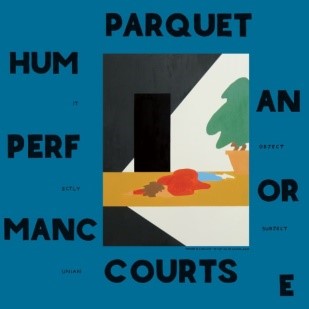It’s easy to look at Parquet Courts as martyrs for ‘social consciousness’ folk music, examining web-warped society through poetry and reconciling techno-dislocation with unmasculine punk and offbeat indie rock from the internet-pre-empting decades of yore. Andrew Savage and co. no doubt grew up educating themselves on that corner of music history spearheaded by Lou Reed and Brian Eno and Neil Young where all anyone wanted to hear was a guitarist experiencing inner maelstrom with agreeable chords in hand, narrowly dodging Led Zeppelin territory by shooing away testosterone’s influence on the whole procedure.
The band’s goal is mostly clear five albums deep: codify their late-20th century idols’ art into a platform for contemporary messages; a similar mechanism to the one folk music has used historically. I mean, we can all turn a blind ear when a ‘60s folk singer is sitting there fingerpicking C F and G on a Martin, because those musical elements and cues have been codified by so many different artists that it just doesn’t matter anymore; it’s a language supplementary to the actual point of the music. That concept of rock music being a communal exchange of ideas is what Parquet Courts is going for. How the band applies it on Human Performance is admirable, but disorienting. In finally cleaning up and colourising their previously dry sepia sound, the instrumental sounds and cues occasionally become so directly referential to very particular music that it starts feeling like a joke. “Captive of the Sun” is the sound of an Odelay era Beck going cold turkey. “Steady on My Mind” is, like, literally a Velvet Underground song. Parquet Courts is of course just one among countless projects under that influence, the thing is that here they’re not exactly ‘taking cues’ but rather holding their headstocks and pedals up to the sunlight and tracing “Pale Blue Eyes” nuance for nuance. “One Man No City” also tries to hide its rephrased plagiarism by turning the nightlight raga of “Lady Godiva’s Operation” into a roadtrip jam.
Human Performance feels most assured at its most concise and poppy – “Outside”, “Berlin Got Blurry”, “Pathos Prairie” as well as the title track are all among the band’s most profound moments. This is engaging, modestly straightforward rock music with a few textural quirks and extremely strong lyricism. Parquet Courts may be overtly influenced by other music but they end up getting away with it because, like folk, it’s the singing that holds the purpose. It’s just a shame how wobbly they straddle the line between reference and parody.
Review by Harry Manson

